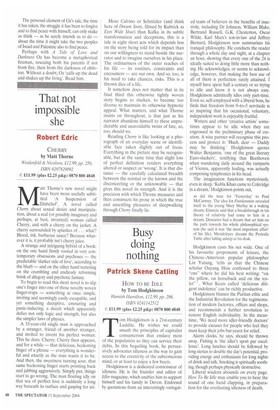Busy doing nothing
Patrick Skene Catling
How TO BE IDLE by Tom Hodgkinson Hamish Hamilton, £12.99, pp. 286, ISBN 0241142512 £11.99 (plus £2.25 p&p) 0870 800 4848
Tam Hodgkinson is a 21st-century Luddite. He wishes we could smash the principles of capitalist consumerism that enslave most of the population so they can service their debts. In this beguiling book, he persuasively advocates idleness as the way to gain access to the creativity of the subconscious mind, or at least to enjoy a few beers.
Hodgkinson is a dedicated connoisseur of idleness. He is the founder and editor of Idler magazine, which enables him to support himself and his family in Devon. Endorsed by quotations from an interestingly variegat
ed team of believers in the benefits of inactivity, including Dr Johnson, William Blake, Bertrand Russell, G.K. Chesterton, Oscar Wilde, Karl Marx's son-in-law and Jeffrey Bernard, Hodgkinson now summarises his tranquil philosophy. He conducts the reader through a whole day and night, at a chapter an hour, showing that every one of the 24 is ideally suited to doing little more than nothing. He acknowledges, or seems to acknowledge, however, that making the best use of all of them is perfection rarely attained. I myself have spent half a century or so trying to idle and know it is not always easy. Hodgkinson admittedly idles only part-time. Even so, self-employed with a liberal boss, he finds that freedom from 9–to-5 servitude is so inspiring that his occasional, voluntary, independent work is enjoyably fruitful.
Writers and other 'creative artists' sometimes appear to be idle when they are engrossed in the preliminary phase of creation. A wise partner will recognise this process and protect it: 'Hush, dear — Daddy may be thinking.' Hodgkinson quotes Walter Benjamin, 'one of the great literary Euro-slackers', testifying that Beethoven when wandering daily around the ramparts of Vienna, apparently loafing, was actually composing symphonies in his head.
The imagination functions mysteriously, even in sleep. `Kubla Khan came to Coleridge in a dream,' Hodgkinson points out,
as did the tune for 'Yesterday' to Paul McCartney. The idea for Frankenstein revealed itself to the young Mary Shelley in a waking dream; Einstein said that a breakthrough in his theory of relativity had come to him in a dream; Descartes had a dream that set him on the path towards his whole philosophical system (he said it was the most important affair' of his life). Mendeleyev dreamt the Periodic Table after falling asleep at his desk.
Hodgkinson casts his net wide. One of his favourite proponents of leisure, the Chinese–American popular philosopher Lin Yutang, 'tells us that the Chinese scholar Ouyang Hsiu confessed to three "ons" where he did his best writing: "on the pillow, on horseback and on the toilet" ' . What Keats called 'delicious diligent indolence' can be richly productive.
Hodgkinson blames the Puritan ethic and the Industrial Revolution for the regimentation of modern factories, offices and shops, and recommends a further revolution to restore English individuality. In the meantime, 'We need more idler-friendly doctors' to provide excuses for people who feel they must keep their jobs but yearn for relief.
Alarm clocks, he says, should be thrown away. Fishing is 'the idler's sport par excellence'. Long lunches should be followed by long siestas to double the day's potential, providing energy and enthusiasm for long nights of drink and talk. Smoking is spiritually soothing, though perhaps physically destructive.
Liberal wisdom abounds on every page. How To Be Idle may enable you to hear the sound of one hand clapping, in preparation for the everlasting idleness of death.










































































 Previous page
Previous page